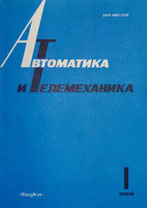|
This article is cited in 3 scientific papers (total in 3 papers)
Experience of intellectualization of situational modeling methods for discrete time-varying spatial objects
A. Ya. Fridman
Institute for Informatics and Mathematical Modelling, Kola Science Center, Russian Academy of Sciences, Apatity, Murmansk oblast, 184200 Russia
Abstract:
The application of the ideas of artificial intelligence to problems of situational modeling and control of discrete spatial dynamic systems is considered. A set of methods for the synthesis and quantitative comparison of alternative structures and scenarios for the development of the modeling object synthesized taking into account the preferences of the decision maker is presented. As an example of the implementation of these methods, a situational modeling system is described the core of which is the conceptual model of the subject domain and the expert and geoinformation systems integrated with it. The model is formalized in the paradigm of a semiotic formal system; this has made it possible to give strict definitions to the basic concepts of D.A. Pospelov's situational control, which are absent in the prototypes, and thereby provide a unified processing of heterogeneous information and automate a detailed analysis of the model consistency and its operational modification.
Keywords:
industrial-natural complex, conceptual model of the subject domain, structural synthesis, situational control, intelligent applied system.
Citation:
A. Ya. Fridman, “Experience of intellectualization of situational modeling methods for discrete time-varying spatial objects”, Avtomat. i Telemekh., 2022, no. 6, 151–168; Autom. Remote Control, 83:6 (2022), 946–959
Linking options:
https://www.mathnet.ru/eng/at15982 https://www.mathnet.ru/eng/at/y2022/i6/p151
|

| Statistics & downloads: |
| Abstract page: | 112 | | References: | 38 | | First page: | 17 |
|




 Contact us:
Contact us: Terms of Use
Terms of Use
 Registration to the website
Registration to the website Logotypes
Logotypes







 Citation in format
Citation in format 
